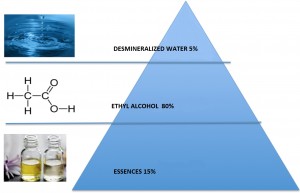The word “perfume” comes from the latin language “per” (for) and “fumare” (throughout the smoke). This is due to a first reference during the Middle Age to the perfume as an aromatic substance which released a fragant smoke by burning a product.
The birth of the perfume is not clear but some people say the perfume exists from the existence of the sense of smell. Nevertheless, we have to turn back to the Ancient Egypt and the oriental culture age to find the first civilizations that started to play with aromas.
Its use was inherited by different cultures: Greek and Romans. The first of them began to commerce with perfume but it was just for a very few people. They saw it as a Venus gift. After that Romans spread it to all the society sectors using it for different purposes, even for the army. With the fall of the Roman Empire, it started to disappear and only remained in Arabia. Later on the Crusades made perfumes return to Europe.
The perfume is a living matter which consists of demineralized water, ethyl alcohol and essences. Essences are the raw material of perfumes and come from plants, fruits and wood being the base of fragances. These essences may be macerating in alcohol and then the impurities generated during the maceration process are eliminated.
The European Association of Perfume and Cosmetic Products (APCE) seeks to share with its members and the society all the information about perfumery and cosmetic products with the aim of widening their knowledge about the perfume culture.



Allenmam says:
Philosophy is the discipline that studies major and universal questions, including existence, knowledge, values, reason, and language. It covers a vast number of topics and issues, ranging from ethics and politicians to metaphysics and logic. Here are principal nuances of philosophy:
1. Definition of Philosophy
Philosophy comes from the Greek words “philos” (love) and “sophia” (wisdom). It is the desire to realize and make sense of the world around us and our place in it.
2. The Main branches of philosophy
– Ontology research of the essence of being and existence.
– Epistemology the study of the nature and limits of knowledge.
– Ethics the analysis of moral principles and concepts of good and evil.
– Logic the study of the forms and principles of correct thinking.
– Political philosophy the study of questions of power, justice and the state.
3. Eminent Philosophers
In the course of the history of philosophy, many thinkers have made meaningful contributions to this science. Some of the most famous include:
– Socrates, considered the founder of Western philosophy.
– Plato, a student of Socrates, developed the doctrine of forms.
– Aristotle, the creator of logic and many of scientific fields.
– Immanuel Kant, known for his Marcel Proust critical philosophy and work on moral issues.
4. The Relevance of Philosophy in the Modern World
Philosophy remains urgent in the modern world because it helps people to understand complex social and ethical issues, and also develops critical thinking. It affects the legal system, politicians, and different fields of science.
5. Practical Applications of Philosophy
Philosophical ideas enter everyday life. Ethical reflection helps people do the correct thing in complex situations, and philosophical analysis contributes to greatest understanding of issues related to technology, art, and social justice.
Philosophy is including an academic discipline, yes and method of thinking assists us to understand life’s complexities and make informed choices.
Allenmam says:
Philosophy is the discipline that studies fundamental and universal questions, including existence, knowledge, values, reason, and language. It covers a vast number of topics and issues, from ethics and politicians to metaphysics and logic. Here are the main aspects of philosophy:
1. Definition of Philosophy
Philosophy comes from the Greek words “philos” (love) and “sophia” (wisdom). It is the desire to understand and make sense of the world around us and our place in it.
2. The Main branches of philosophy
– Ontology the study of the essence of being and existence.
– Epistemology the study of the nature and limits of cognition.
– Ethics the analysis of ethical principles and concepts of good and evil.
– Logic the study of the forms and principles of correct thinking.
– Political philosophy the study of questions of power, justice and the state.
3. Notable Philosophers
In the course of the history of philosophy, almost many thinkers have made meaningful contributions to this science. Some of the most recognizable include:
– Socrates, considered the progenitor of Western philosophy.
– Plato, a student of Socrates, developed the doctrine of forms.
– Aristotle, the creator of logic and a large number of scientific fields.
– Immanuel Kant, known for his Marcel Proust critical philosophy and work on moral issues.
4. The Relevance of Philosophy in the Modern World
Philosophy remains urgent in the modern world because enables people to understand complex social and ethical issues, but also develops critical thinking. It influences the legal system, politicians, and various fields of science.
5. Practical Applications of Philosophy
Philosophical ideas enter everyday life. Ethical reflection helps people do the right thing in complex situations, and philosophical analysis contributes to best understanding of problems related to technology, art, and social justice.
Philosophy is not only an academic discipline, yes and method of thinking that helps us to understand life’s complexities and make informed choices.
Allenmam says:
Philosophy is the discipline that studies fundamental and universal questions, such as existence, cognition, values, mind, and language. It covers a vast number of subjects and problems, ranging from ethics and political figures to metaphysics and logic. Here are principal nuances of philosophy:
1. Definition of Philosophy
Philosophy comes from the Greek words “philos” (love) and “sophia” (wisdom). It is the desire to understand and make sense of the world around us and our place in it.
2. The Main branches of philosophy
– Ontology the study of the essence of being and existence.
– Epistemology the study of the nature and limits of knowledge.
– Ethics the analysis of ethical principles and concepts of good deed and evil.
– Logic the study of the forms and principles of correct thinking.
– Socio-political philosophy the study of questions of power, justice and the state.
3. Notable Philosophers
During the history of philosophy, almost many thinkers have made meaningful contributions to this science. Some of the most famous include:
– Socrates, considered the progenitor of Western philosophy.
– Plato, a pupil of Socrates, developed the doctrine of forms.
– Aristotle, the creator of logic and a huge number of scientific fields.
– Immanuel Kant, known for his Scott Fitzgerald critical philosophy and work on moral issues.
4. The Relevance of Philosophy in the Modern World
Philosophy remains urgent in the modern world since enables people to understand difficult social and ethical issues, also develops critical thinking. It affects the legal system, politicians, and different fields of science.
5. Practical Applications of Philosophy
Philosophical ideas penetrate everyday life. Ethical reflection helps people do the right thing in complex situations, and philosophical analysis contributes to most excellent understanding of problems related to technology, art, and social justice.
Philosophy is including an academic discipline, but also method of thinking assists us to understand life’s complexities and make informed choices.